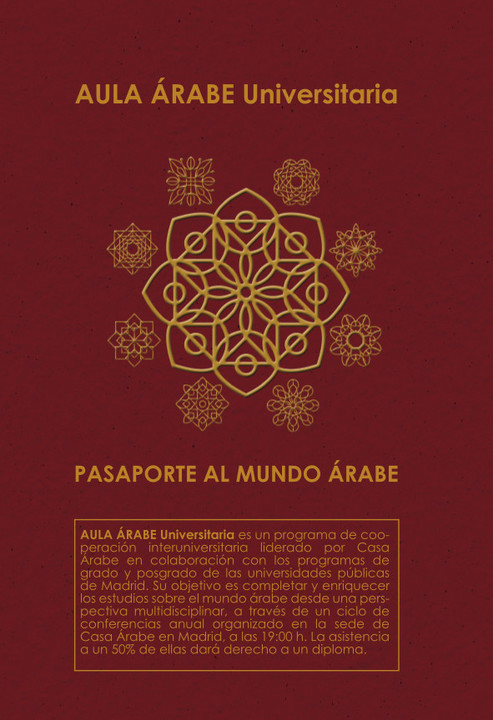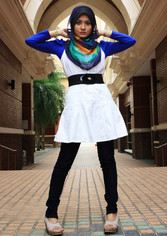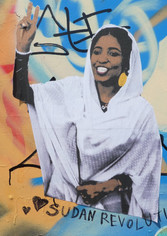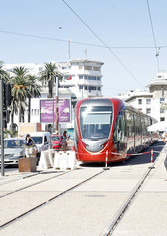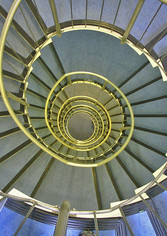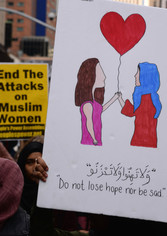Conferences and debates
Index / Activities / Conferences and debates / “Aula Árabe”
“Aula Árabe”
From September 23, 2019 until April 12, 20207:00 p.m.
MADRID
Casa Árabe headquarters (at Calle Alcalá, 62).
7:00 p.m.
Free entry until the event’s capacity is reached.
“Aula Árabe” is a new annual program held in conjunction with several
universities, organized by Casa Árabe with the cooperation of Madrid’s
public universities.
Aula Árabe will involve the organization of various conferences by Casa Árabe at its Madrid headquarters throughout the academic year, as proposed by the associated bachelor’s and Master’s degree programs, with contents which will be adapted to their curriculum and thematic needs.
The objective is to promote knowledge about the Arab world and to complement the education given in the member university programs from a multidisciplinary perspective, offering students the chance to come in contact with relevant speakers and experts at the international level in different fields and areas related with the Arab world.
Aula Árabe is being launched as a pilot program for the academic year of 2019-20, with one conference per month assigned to each of the associated programs which have submitted proposals. The conferences will be held at Casa Árabe’s installations during the regular evening conference schedule (at 7:00 p.m.) and are open to the general public. As a result, simultaneous translation will be provided.
Joining this pilot edition of the program or having shown an interest are twenty different bachelor’s, Master’s and special degree programs, nine of which are already playing an active role (by submitting speaker proposals). Of these, nine programs have come from the Universidad Complutense de Madrid (UCM), seven from the Universidad Autónoma de Madrid (UAM), three from the Universidad Rey Juan Carlos (URJC) and one from the Universidad Carlos III de Madrid (UC3M).
The objective is to promote knowledge about the Arab world and to complement the education given in the member university programs from a multidisciplinary perspective, offering students the chance to come in contact with relevant speakers and experts at the international level in different fields and areas related with the Arab world.
Aula Árabe is being launched as a pilot program for the academic year of 2019-20, with one conference per month assigned to each of the associated programs which have submitted proposals. The conferences will be held at Casa Árabe’s installations during the regular evening conference schedule (at 7:00 p.m.) and are open to the general public. As a result, simultaneous translation will be provided.
Joining this pilot edition of the program or having shown an interest are twenty different bachelor’s, Master’s and special degree programs, nine of which are already playing an active role (by submitting speaker proposals). Of these, nine programs have come from the Universidad Complutense de Madrid (UCM), seven from the Universidad Autónoma de Madrid (UAM), three from the Universidad Rey Juan Carlos (URJC) and one from the Universidad Carlos III de Madrid (UC3M).
-
“Give Me a Like”: Arab society and technology
September 30, 20197:00 p.m.MADRIDCasa Árabe Auditorium (at Calle Alcalá, 62). 7:00 p.m. Free entry until the event’s capacity is reached.In Arabic, with simultaneous translation.Zohor Gourram, a novelist, literary critic and professor at the Université Mohammed V in Rabat, is giving this conference in Madrid on September 30, the first in the conference series program “Aula Árabe (“Arab Lectures”).”The event will be presented by Pedro Martínez-Avial, the General Director of Casa Árabe, and Gonzalo Fernández Parrilla, a professor of Arab and Islamic Studies at the Universidad Autónoma de Madrid (UAM).
This is the first conference in a new series titled “Aula Árabe” and the Master’s degree program in Arab and Islamic Studies at the UAM. Professor Zohor Gourram will examine Arab society’s relationship with new technologies and explain how technological developments are influencing thought and creating new forms of participation and political, social and artistic expression. Has a new society arisen which is capable of taking part in the fourth digital revolution with epistemological awareness? Can we now speak of a new Arab reality which transcends the limitations on its development thanks to the technological era? These are just a few of the questions which the conference speaker will attempt to answer, placing a special emphasis on how new technologies affect youths and women.
Conference information sheet
Zohor Gourram
A novelist, critic and scholar, Zohor Gourram is a professor at the Université Mohammed V in Rabat. She was recently bestowed with the Silver Medal awarded to Arab Women for Change (2019), as well as the Katara Prize for literary critics (2016), in addition to others.
Responsible for scientific and cultural projects, and a member of the jury for many different Arab literary awards, including the Arabic Booker Prize, the Sheikh Zayed Award, Al Owais (UAE), the Katara Prize (Doha), the national awards bestowed by Morocco’s Ministry of Culture and the Digital Literature Award, she was a founder of the Union of Arab Writers and director of the magazine Digital Connections, overseeing fictional writing and discourse analysis workshops. She has had numerous novels and essays published. The most notable of her essays include: Enlightened Thought in the Futurology of Mahdi Elmandjra (2018), Towards a Consciousness of Fiction (2017), From the Autobiographical Self to Self-Fiction (2013), Digital Literature (2013), The Formation of the Arab Novel (2012), Approaching Arab and Moroccan Feminist Discourse (2009), Feminine/Feminist Arab Prose: Approaching concept and discourse (2004) and The Hospitality of Censorship (2001). Her most notable novels include Body and City and Ghaitha Picks Up the Moon.
Master’s degree in Contemporary Arab and Islamic Studies (MEAIC)
The Master’s degree in Contemporary Arab and Islamic Studies (MEAIC) at the Universidad Autónoma de Madrid trains specialists who are thus able to deal with the complexity of the Arab and Islamic world through interdisciplinary knowledge of its culture, politics and societies.
The MEAIC is distinguished for offering the possibility to access knowledge about Arab and Islamic realities from inside the worlds of intellectual production where its primary role-players do their work, both Arabs and Muslims who live in their countries of origin and the Arab diasporas in Europe and the Americas. To achieve this, it works with a series of professors from both the UAM itself, as well as the CSIC, UCM, UNED, UGR, UAB and UCLM. With a notable emphasis on the world of research, the education provided in the MEAIC nonetheless makes it possible for students to joing the working world in such fields as cooperation, international relations, journalism and business, becoming specialists qualified on this geo-strategic region thanks to its varied program of professional internships.
-
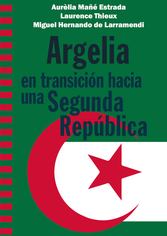
“Algeria in Transition Towards a Second Republic”
November 13, 20197:00 p.m.MADRIDCasa Árabe Auditorium (at Calle Alcalá, 62). 7:00 p.m. Free entry until the event’s capacity is reached.In Spanish.The second session of our program “Aula Árabe Universitaria,” organized by Casa Árabe and the publishing firm Icària, is taking place on the occasion of this book’s presentation. It will be held in Madrid on Wednesday, November 13.The event will include speeches by Miguel Hernando de Larramendi, a professor of Arab and Islamic Studies at the Universidad Castilla-La Mancha, Aurèlia Mañé Estrada, a professor of Political Economics at the University of Barcelona, and Laurence Thieux, a professor of International Relations at the Universidad Complutense de Madrid. Presented by: Karim Hauser, Casa Árabe’s Coordinator of International Relations.
For most Spaniards, Algeria remains that great unknown country on the southern shore of the Mediterranean, despite its geographic proximity. Some people intrigued by the situation in Algeria and those who would like to learn more about the key historical features of the current crisis may do so through the authors of this recently published book. To gain a better understanding of revolutionary Algeria in the sixties and to observe phenomena like the role played by Islamism in the nineties from a different perspective, some vital information must be known. These points of reference will also make it possible to understand the popular Algerian movement known as “Hirak,” which has managed to achieve the resignation of President Bouteflika, opening the way towards a Second Algerian Republic.
The meeting will be the second conference in the program titled Aula Árabe Universitaria 2019-20, which forms part of the Master’s degree program in International Economics and Development at the Universidad Complutense de Madrid. Aula Árabe Universitaria is a new annual inter-university program organized by Casa Árabe with the cooperation of Madrid’s public universities (UAM, UCM, UC3M and URJC), with the goal of furthering knowledge about the Arab world and complementing the training given in the associated university programs from a multidisciplinary perspective.
Event information sheet
-
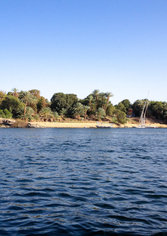 Image: UpM
Image: UpMWater diplomacy in the Mediterranean
November 21, 20197:00 p.m.MADRIDCasa Árabe Auditorium (at Calle Alcalá, 62). 7:00 p.m. Free entry until the event’s capacity is reached.In Spanish.Third conference in the series Aula Árabe Universitaria, given by Isidro González, the Assistant Vice-Secretary General of the Union for the Mediterranean (UpM) for Water, the Environment and the Blue Economy.The opening of this session will be presented by Pedro Martínez-Avial, the General Director of Casa Árabe, and Cristina García Fernández, coordinator of the Master’s degree program on the EU and Mediterranean at the Universidad Complutense de Madrid (UCM).
Of all regions around the world, the Mediterranean is the second most affected by climate change, according to a report presented by the group of climate change and environment experts of the Mediterranean (MedECC) at the meeting held by the Ministers of Foreign Affairs of the UpM on October 10.
The conference, organized with the cooperation of the Master’s degree on the EU and Mediterranean at the Universidad Complutense de Madrid (UCM), will be analyzing the impact this will have on water resources in the region and the role of the Water Agenda which is being developed by the UpM as a promoter of water diplomacy in the Mediterranean and a facilitator of water Infrastructure financing in the area. In particular, they will examine the case of the desalinization plant project in Gaza, one of the most important being facilitated by the UpM, in an area where more than 95% of the water is not potable and aquifers are polluted. Within the framework of other initiatives, including the AECID’s MASAR Water Program, they will also be analyzing the relationship between water stress and security due to the security-related consequences in the form of potential conflicts that may be spurred by water shortages.
Isidro González Alfonso
A career diplomat from Spain who has served in the Ministry of Foreign Affairs, the European Union and Cooperation for the last eighteen years, holding positions such as counsel and main advisor to many cabinets of Ministers of Foreign Affairs in Madrid, more recently he has been an advisor to the Embassy of Spain in Rabat. He was also a member of the Spanish team of the OSCE presidency in 2007, of Spain’s Permanent Mission to the Organization for Security and Cooperation in Europe, in Vienna; Assistant Mission Chief at the Embassy of Spain in Nicosia, and Assistant Consul General at Spain’s Consulate General in Jerusalem. González Afonso has lengthy experience in the Mediterranean region, with a special focus on regional integration and negotiations for conflict management and resolution.
The Master’s degree program on the EU and Mediterranean (UCM)
This program is the result of a process to integrate academic networks which are working on both European and Mediterranean topics. Its objective is to train professionals with a specific outlook who are able to promote integration between Europe, and the southern and eastern Mediterranean. Its highest priority lines of work are: furthering European construction and the operation of its institutions, developing legal and economic Infrastructures, development cooperation, the European socioeconomic culture, EU policies and, above all else, its Euro-Mediterranean outreach.
Further information on the Master's degree program
The Aula Árabe Universitaria Master’s degree program
This is a new annual program held in conjunction with several universities, organized by Casa Árabe with the cooperation of Madrid’s public universities (UAM, UCM, UC3M and URJC). The objective is to promote knowledge about the Arab world and to complement the education given in the member university programs from a multidisciplinary perspective, offering students the chance to come in contact with relevant speakers and experts at the international level in different fields and areas related with the Arab and Muslim world. Aula Árabe will include the organization of various conferences by Casa Árabe at its Madrid headquarters throughout the academic year, as proposed by the associated bachelor’s and Master’s degree programs, with contents which will be adapted to their curriculum and thematic needs.
-
Perspectives of the Scene in Sudan
December 10, 20197:00 p.m.MADRIDCasa Árabe Auditorium (at Calle Alcalá, 62). 7:00 p.m. Free entry until the event’s capacity is reached.In English and Spanish, with simultaneous translation.Within the framework of Aula Árabe Universitaria, Casa Árabe has organized this conference in Madrid on Tuesday, December 10. It will be given by Nagi Idris, director of the London Centre of International Law Practice.At the conference, Nagi Idris will be accompanied by Amal Abuwarda Pérez, a professor and researcher on International Security at the Universidad Rey Juan Carlos, and Karim Hauser, Casa Árabe’s International Relations Coordinator.
In April of 2019, President Omar al-Bashir was overthrown after thirty years of authoritarian government in Sudan. After months of peaceful civil protests, the Sudanese military, forced the leader to stand down from his position. Less than four months later, the military and civil leaders headed by Abdalla Hamdok, an economist with decades of experience at the UN, managed to form a transitional government. The transition may continue this positive development, provided that there is a will within the Sudanese security apparatus to hand power over the civilian leaders. Likewise, stabilizing the country and improving its economic situation will also depend upon the support of external role-players. At this fourth conference in the series Aula Árabe Universitaria, Professor Nagi Idris, director of the London Centre of International Law Practice, will be analyzing the prospects and potential scenarios existing in Sudan’s process of political transition. Organized with the cooperation of the Master’s degree in International Journalism at the Universidad Rey Juan Carlos.
Nagi Idris, director of the London Centre of International Law Practice, is an international lawyer and member of the International Bar Association, with over 19 years of experience. He has a bachelor’s degree in Law from the University of Khartoum and possesses diplomas from the International Bar Association and the College of Law of England and Wales. He also has a bachelor’s degree in Linguistics from the Chartered Institute of Linguists and possesses the Islamic Finance Qualification awarded by the Chartered Institute for Securities and Investment. He formerly worked as a legal consultant at Peter Dovey & Co Solicitors, where he provided consultation on subjects involving international contracts and international Infrastructure development. One of his particular interests is International Law and conflict resolution in different arenas (borders, international investments and international energy law). He is a member of the Society of International Economic Law and the Human Rights Institute, and of the committees on Arbitration, Petroleum and Gas Law, Water Rights, War Crimes and the Regional Arab Forum of the International Bar Association. He is also a member of the Sudanese Bar Union.
Amal Abuwarda Pérez is a lawyer and political scientist with a PhD in International Relations from the Universidad Complutense de Madrid. She is a professor and researcher on International Security, the Arab world and the Islamic world, with a Master’s degree in International Journalism from the Universidad Rey Juan Carlos, as well as a University Master’s degree in International Relations and Communication from the Universidad Camilo José Cela.
-
Morocco’s Economic Diplomacy
February 05, 20207:00 p.m.MADRIDCasa Árabe Auditorium (at Calle Alcalá, 62). 7:00 p.m. Free entry until the event’s capacity is reached.In Arabic, with simultaneous translation into Spanish.The sixth conference in the Aula Árabe Universitaria series, it is devoted to the role played by Moroccan state-owned companies and will be given by Tahar El Qour, a professor at Abdelmalek Essaâdi University in Tangiers.The event will be presented by Olivia Orozco, Casa Árabe’s Economics and Training Coordinator, and José María Mella, a professor emeritus at the Universidad Autónoma de Madrid.
At the conference, organized with the cooperation of the University Master’s degree program in Economic Development and Public Policy (MDEYPP) at the Universidad Autónoma de Madrid (UAM), Morocco’s economic diplomacy will be analyzed on the basis of the role being played by Moroccan state-owned companies in terms of their international expansion, examining the specific case of the electricity and gas company ONEE in particular.
State-owned companies have become key role-players to examine when analyzing the economic and social dynamics of Morocco, also making contributions as increasingly active role-players in the country’s implementation of economic diplomacy, above all in Africa. This in fact translates into an ever greater internationalization of state-owned companies, as well as a whole series of new demands in terms of governance, when bearing in mind that the content, modus operandi and focuses of this economic diplomacy and the role-players therein have experienced considerable change as a result of globalization.
The goal of the conference is to reflect upon the intervention of state-owned companies in the international arena in general, and that of economic diplomacy in particular. To achieve this, there will be discussion of factors involving the strategic outlook and assistance for companies provided by the State, the forms and structures of organizations, the systems and processes for oversight, human resources policy, and the culture of businesses and their relations with other parties concerned. Using this conceptual framework, the results will be presented on a case study about a state-owned company which takes part in the country’s public diplomacy through activities which it performs in Africa, ONEE, the National Office of Electricity and Water.
Conference information sheet
Tahar El Qour is a researching professor at Abdelmalek Essaâdi University’s National School of Trade and Management in Tangiers, as well as a guest professor at the School of Higher Social Science Studies (EHESS, as it is known by its acronym in French) in Paris. He has made numerous scientific contributions in the field of international economic relations and public diplomacy. These include his doctoral thesis devoted to “Morocco’s Economic Diplomacy” (EHESS, 2007). An important social role-player, he is also responsible for having organized many different events of a scientific and cultural nature in Morocco.
University Master’s degree in Economic Development and Public Policy (UAM)
The Master’s degree program in Economic Development and Public Policy (MDEYPP) seeks to train experts on growth analysis and economic development, and the economics and policies of the Public Sector. More specifically, the program provides advanced knowledge and teaches the proper instrumental techniques to analyze matters related with countries’ development and economic growth, economic integration, inequality and poverty, sustainable development, the globalization of economies, evaluating public policies, tools for public management and the analysis of efficiency and equality in public policies. The training acquired during this Master’s program enables students to research and/or work at public and private institutions, such as international entities, universities, research centers, think-tanks, NGOs, and so on.
Further information on the Master’s degree program
Aula Árabe
Aula Árabe Universitaria is a new annual program held in conjunction with several universities, organized by Casa Árabe with the cooperation of Madrid’s public universities (UAM, UCM, UC3M and URJC). The objective is to promote knowledge about the Arab world and to complement the education given in the members’ university programs from a multidisciplinary perspective, offering students the chance to make contact with prominent speakers and experts at the international level from different fields and areas related with the Arab and Muslim world. Aula Árabe will include the organization of various conferences by Casa Árabe at its Madrid headquarters throughout the academic year, as proposed by the associated bachelor’s and Master’s degree programs, with contents which will be adapted to their curriculum and thematic needs.
-
Promoting Democracy in the Middle East: A transatlantic focus?
February 10, 20207:00 p.m.MADRIDCasa Árabe Auditorium (at Calle Alcalá, 62). 7:00 p.m. Free entry until the event’s capacity is reached.In English and Spanish, with simultaneous translation.On Monday, February 10, we will be holding a new session in our program Aula Árabe Universitaria, with this conference given by Oz Hassan, an associate professor from the University of Warwick.Speaking with Hassan will be Ignacio Molina, a professor of Political Science and International Relations at the Universidad Autónoma de Madrid, and Karim Hauser, Casa Árabe’s International Relations Coordinator.This is the seventh conference in the series Aula Árabe Universitaria, organized with the cooperation of the Master’s degree programs in Democracy and Governance, and Erasmus Mundus EUROSUD-South European Studies at the Universidad Autónoma de Madrid (UAM).
Over the last two decades, both Washington and Brussels have attempted to fit their own interests in with an effort to promote democratic transformations in the Middle East. However, faced with an increasingly complex regional architecture, the United States and EU have demonstrated that they are not well-equipped to deal with their desire to promote democracy in a more and more turbulent region. In fact, as these transatlantic partners have grown more distant in the recent past, embracing a greater dependence upon authoritarian strongmen, it has become valid to question the credibility of any agenda that promotes democracy in the region.
Oz Hassan is an associate professor at the University of Warwick’s Department of Politics and International Studies. He is currently completing a research report titled “Transatlantic Interests and Democratic Possibility in a Transforming Middle East.” This research project analyzes US and EU policy in the Middle East and North Africa in order to understand how “conflicts of interest” continue in the region’s post-revolutionary environment. Hassan is a former visiting scholar in the Democracy and Rule of Law program at the Carnegie Endowment for International Peace in Washington and authored the book Constructing America’s Freedom Agenda for the Middle East. His work has been published in many journals on international relations, including articles on relations between the United States and Middle East.
Master’s degree in Democracy and Governance (UAM) and Erasmus Mundus EUROSUD-South European Studies Master’s degree program (UAM)
The School of Law’s Official Graduate Master’s Degree Program is intended for university degree-holders who have been trained in Political Science, other social sciences or related disciplines, such as History or Journalism, who would like to specialize as technicians and managers for public and/or private organizations, public policy analysts, sociopolitical analysts, advisors, international consultants, educators and researchers. Starting in the academic year of 2019-2020, students will share classes with the students from the Erasmus Mundus South European Studies (EUROSUD) Master’s degree program put on by the University of Glasgow, with which six European universities are associated, as well as other research centers and cultural organizations. Since the program was first held in 2006, the Master’s degree in Democracy and Governance has been ranked one of the best Master’s degree programs in Political Science on the list published by the newspaper El Mundo.
Aula Árabe Universitaria
This is a new annual program held in conjunction with several universities, organized by Casa Árabe with the cooperation of Madrid’s public universities (UAM, UCM, UC3M and URJC). The objective is to promote knowledge about the Arab world and to complement the education given in the member university programs from a multidisciplinary perspective, offering students the chance to come in contact with relevant speakers and experts at the international level in different fields and areas related with the Arab and Muslim world. Aula Árabe will include the organization of various conferences by Casa Árabe at its Madrid headquarters throughout the academic year, as proposed by the associated bachelor’s and Master’s degree programs, with contents which will be adapted to their curriculum and thematic needs.
-
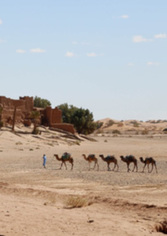 Photo: Camels cross Draa river in Morocco, which is mostly dry throughout the year except when the water is released by the dam upstream. Some villages are half empty after residents left seeking better opportunities. (Viktorija Mickute / Al Jazeera)
Photo: Camels cross Draa river in Morocco, which is mostly dry throughout the year except when the water is released by the dam upstream. Some villages are half empty after residents left seeking better opportunities. (Viktorija Mickute / Al Jazeera)Adapting to Climate Change in the MENA Region: Good practices and areas for improvement
February 27, 20207:00 p.m.MADRIDCasa Árabe Auditorium (at Calle Alcalá, 62). 7:00 p.m. Free entry until the event’s capacity is reached.In English, with simultaneous translation into Spanish.Eighth conference in the series Aula Árabe Universitaria, given by Professor Mohamed Behnassi, of the Ibn Zohr University in Agadir.Climate change has recently been identified as a major risk, mainly because of the impact on socio-ecological systems which increase temperatures, sea level and the number of natural disasters. These impacts also grow in size through positive feedback cycles which exponentially multiple dangers, thus making vulnerabilities, tensions and pre-existing situations of instability even more acute. In fact, even if we stick to the current climate change prospects and remain within the Paris Consensus, foreseeing a temperature increase of 1.5 degrees above pre-industrial levels, the impact on climate may vary the way ecosystems work and have dire effects on vital resources, which would alter food security, health care, migratory dynamics and a whole generation of conflicts. This is why the decision to adapt to these changes has taken on such vital importance.
In the MENA region, many countries are extremely vulnerable to climate change, with indirect socioeconomic consequences that, in turn, affect their stability and advancement towards achieving the Sustainable Development Goals (SDGs) and their resilience. Various factors contribute to this region’s special vulnerability, including insufficient resources, inappropriate systems of governance and the failure of framework policies.
Within this context, Casa Árabe has organized this conference on “Adapting to Climate Change in the MENA Region: Good practices and areas for improvement,” given by Mohamed Behnassi, the head researcher and a professor of Global Environmental Policy and Human Security at the School of Law, Economics and Social Sciences at Ibn Zohr University. It will be the eighth session in the Aula Árabe Universitaria (AAU) event series, given with the cooperation of the Master’s degree program in International Policy: Sector and Area-based Studies, offered by the Universidad Complutense de Madrid (UCM). The session will be introduced by Rafael Bustos, a professor of International Relations at the Universidad Complutense de Madrid (UCM) and the coordinator of the aforementioned Master’s degree program.
At the session, Professor Mohamed Behnassi will provide an estimate of the different risks and impacts involving climate change in the MENA region, and Arab countries in particular, examining their levels of vulnerability in terms of these risks and impacts. His goal is to identify the existing response mechanisms implemented in the region, above all with regard to the topic of adapting to climate change. Last of all, he will assess the different areas for improvement we can find in the field of adaptation, as well as the way to deal with them within the framework of the SDGs, human security and resilience.
Conference information sheet
Mohamed Behnassi is the head researcher and a professor of Global Environmental Policy and Human Security at the School of Law, Economics and Social Sciences at Ibn Zohr University in Agadir, Morocco. A specialist in climate and environmental change, and on human security policies, he earned a PhD in International Environmental Law and Governance from the Université Hassan II in 2003 and has a diploma in International Environmental Law and Diplomacy from the University of East Finland and the United Nations Program for the Environment (2015). From 2015 to 2018, he ran the Research Laboratory for Territorial Governance, Human Security and Sustainability in Lagos. At present, he is the founding director of the Center of Research for the Environment, Human Security and Governance (CERES), which forms part of the MedThink 5+5 network, and he was named by the Medecc network (Mediterranean Experts on Climate and Environmental Change) to head its upcoming assessment report (MAR1). Amongst his many publications, he has been the co-editor of: Human and Environmental Security in the Era of Global Risks (Springer 2019); Climate Change, Food Security and Natural Resource Management (Springer 2019); and Environmental Change and Human Security in Africa and the Middle East (Springer 2017).
Master’s degree in International Politics: Sector and Area-based Studies (UCM)
The University Master’s degree program in International Politics: Sector and Area-based Studies intends to provide its students with the knowledge, skills and abilities which will allow them to deal with the professional challenges they face in the public arena in a positive, favorable manner, thanks to advanced, multidisciplinary training oriented towards specialized academic and scientific activities involving international topics that are becoming increasingly necessary for both Spanish society and the rest of Europe. Though the program mainly follows an academic and scientific orientation, it also contributes knowledge and skills to carry out activities related with: political analysis of countries and regions (Arab and Islamic world, Latin America, Europe and Russia); assessment and advisement on security and defense-related topics, including intelligence services; the fundamentals of international political and economic history; studies on the foreign policy of Spain, the European Union and Russia; international observance of elections; the international media and their role in the main conflicts; studies on phenomena such as terrorism and organized crime, and research on topics currently on the international agenda, as they can be found at the main international forums and organizations.
Further information on the Master’s degree program
-
Muslim Women and Islamophobia in Europe: Racism, social movements and the State
March 04, 20207:00 p.m.MADRIDCasa Árabe Auditorium (at Calle Alcalá, 62). 7:00 p.m. Free entry until the event’s capacity is reached.In English, with simultaneous translation into Spanish.Ninth conference in the Aula Árabe Universitaria series, given by Professor Narzanin Massoumi, of the University of Exeter. It will be taking place in Madrid on Wednesday, March 4.In their counterterrorism policies, European governments have gradually adopted focuses oriented towards the topic of gender. The nature of such activities has shifted from directly recruiting women to perform tasks in fighting terrorism to choosing more covert strategies aimed at involving or shaping the direction of the civil society made up of Muslim women.
At this ninth session of the series Aula Árabe Universitaria (AAU), Narzanin Massoumi, a professor of Criminology and Sociology at the University of Exeter, will outline and evaluate the way in which these strategies are developed, first and foremost highlighting the limitations that have arisen in terms of the lack of evidence and basic knowledge behind governmental policies to fight radicalization, tackling these problems through an underlying analysis which is “racialized” and conditioned by gender. After this, she will perform critical reflection on the existing academic research which attempts to understand gender-based factors in counterterrorism policy rather than offer alternative explanations based on empirical evidence about social movements.
Casa Árabe has organized this conference with the cooperation of the Master’s degree in Advanced Studies on Islam in Contemporary European Society at the Universidad Complutense de Madrid (UCM). The session will be introduced by Laura Mijares, a professor of Arab and Islamic Studies at that university.
Narzanin Massoumi is a professor of Criminology and Sociology and a post-doctoral researcher with the British Academy in the Department of Sociology, Philosophy and Anthropology at the University of Exeter. Her research revolves around the topics of racism, social movements and fighting terrorism, with a current focus on researching the impact of counterterrorist policy and praxis in higher education in the United Kingdom. She has authored Muslim Women, Social Movements and the ‘War on Terror’ (Palgrave Macmillan, 2016) and is a co-editor of What is Islamophobia? Racism, Social Movements and the State (Pluto, 2017).
Master’s degree in Advanced Studies on Islam and Contemporary European Society (UCM)
A pioneering Master’s degree program, not only because of the subject matter dealt with, but also for doing so through different fields of study, therefore intended for a wide-ranging audience (sociologists, social workers, anthropologists, political scientists, psychologists, journalists, legal scholars and Arabists) who wish to develop more in-depth knowledge about Islam and the status of Muslims in Europe. Though it is a mainly research-based Master’s degree focusing on the production of research on this topic, it is also intended for other graduates and degree-holders who wish to work at organizations or entities related with Muslims, as well as professionals who are already performing their professional work in this arena.
Further information on the Master’s degree program
-
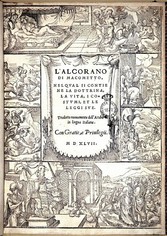 Photo: Front cover of L’Alcorano di Macometto by Giovanni Battista Castrodardo de Belluno, the first printed translation of the Qur’an into a European language (Venice, 1547)
Photo: Front cover of L’Alcorano di Macometto by Giovanni Battista Castrodardo de Belluno, the first printed translation of the Qur’an into a European language (Venice, 1547)Readings of the Qur’an in Latin Europe (12th-16th centuries)
March 12, 20207:00 p.m.MADRIDCasa Árabe Auditorium (at Calle Alcalá, 62). 7:00 p.m. Free entry until the event’s capacity is reached.In Spanish.Tenth conference in the series Aula Árabe Universitaria, given by historian John Tolan, from the University of Nantes.In 1143, Robert de Ketton was given a request by Abbot Peter de Cluny to complete the first translation of the Qur’an into the Latin. This translation, which exists in the form of 24 manuscripts, was one of the main ways in which European readers gained access to the Muslim holy book. Many of those who read it, including Pedro de Cluny himself, did so in order to refute it, because in their mind it was the foundational text for a heretical creed. However, many read the Qur’an for other reasons, which were not always hostile.
In 1543, four centuries after Robert completed his translation, Theodor Bibliander published it in Basel, along with a collection of other texts about Islam and a preface by Martin Luther. For the Protestant writers Bibliander and Luther, the Qur’an may have been a useful tool in the fight against the Catholic Church, a way to demonstrate that, as Luther claimed, “the Pope’s devil is bigger than the Turks’.” Catholic writers quickly developed counterarguments, combing through the Qur’an to find similarities between its “heresies” and those unfurled by Luther or Calvin. The Latin Qur’an, as we shall see, already formed part of Europe’s intellectual and cultural experience in the twelfth to sixteenth centuries, and the interests and uses given to its by European readers were complex and varied.
Casa Árabe has organized this conference on “Readings of the Qur’an in Latin Europe (12th-16th centuries)” by John Tolan, a History professor at the University of Nantes and a member of Academia Europæa, in collaboration with the bachelor’s degree program in History at the Universidad Autónoma de Madrid (UAM). The event will be introduced and moderated by Santiago Palacios Ontalva, a Medieval History professor from that university.
Conference information sheet
John Tolan is a professor of History at the University of Nantes and a member of Academia Europæa. He has a PhD in History from the University of Chicago, a Master’s degree in History from the same university and “Accreditation as a Research Director” (HDR) from the École des Hautes Etudes en Sciences Sociales of Paris, as well as a bachelor’s degree in Classical Languages from Yale University. He has received various awards and distinctions, including two fellowships from the European Research Council (ERC) and the Diane Potier-Boès Award given by the Académie Française. He has authored several books and articles, including: Petrus Alfonsi and his Medieval Readers (1993), Los Sarracenos: el islam en el imaginario europeo en la Edad Media (The Saracens: Islam in the European imaginary in the Middle Ages, 2007), Sons of Ishmael: Muslims through European Eyes in the Middle Ages (2008), Saint Francis and the Sultan: The Curious History of a Christian-Muslim Encounter (2009) and Faces of Muhammad: Western Perceptions of the Prophet of Islam from the Middle Ages to Today (2019). He is one of the four coordinators of the ERC research project “EuQu: The European Qur’an” (2019-2025). .
Bachelor’s degree in History (UAM)
The bachelor’s degree in History aims to educate individuals with a high level of cultural knowledge, possessing a wide range of skills, who can analyze and interpret the social realities of the past and present, remaining open to other cultures. The program offers students a comprehensive education consisting of fundamental and instrumental knowledge which will enable them to practice many professions related with cultural management, teaching research, document analysis, etc. It is one of the highest academically ranked History bachelor’s degrees in Spain and abroad.
Further information about the bachelor’s degree in History (UAM)
Further information about the ERC Synergy project “EuQu: The European Qur’an”

